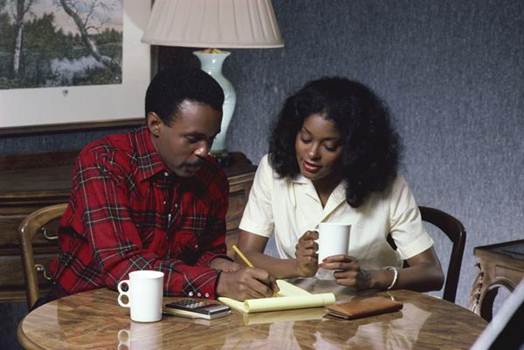Think that love conquers all? Not when it
comes to your bank balance. So what happens when rands get in the way of
romance? We spoke to finance experts, psychologists and couples in the know, so
you can have the best of both worlds.

The
Beatles were right – money can’t buy you love, but it can tear it apart
When last did you talk to your partner about money?
30 percentage more likely you’ll get
divorced if you disagree about finances once a week, rather than a few times a
month. (Source: Utah State University)
Not a flippant discussion about whose
change you used for the last car guard, but a serious conversation about what
money means to you, your spending habits and who pays (or who you feel should
be paying) for what?
If you had to think about it for a while,
we’re not surprised. According to Kiki Theo, money coach, transformational
facilitator and author of Money Alchemy, Money Well and Wealth Journey,
communication is what matters most in relationships, but we often lose sight of
this.
Joburg-based clinical psychologist Liane
Lurie believes each partner has their own unique financial language and
relationship with money. For instance, some may prefer that each partner be
responsible for their own expenses, whereas others believe the money they earn
should contribute towards mutual benefits, care of each other and day-to-day
living expenses. This is fine, as long as you discuss it before making a
long-term commitment, she says. While you don’t have to agree all the time,
compromise is crucial.
“You might want to consider dividing the
payment of bills and living expenses, creating a joint account (and agreeing on
your monthly contributions) and discussing purchases with your partner before
you make them,” says Lurie. “You’re part of a union, which requires balance and
sharing”
And in the current economic climate it’s
more important than ever to find common ground. According to Future Fact 2011,
62 percent of urban South Africans have to budget carefully and struggle to
make ends meet in their household. The question is: could these struggles be
made easier through good communication? Say, for example…
… You’re the breadwinner

Women are increasingly earning more than
their partners, and provided each partner has an equal say in how money is
spent and invested, this arrangement can work, says Lurie. “It’s important that
your partner feels like he’s contributing equally (in his own way) to the
stability and wellbeing of your relationship and family,” she says. So if he’s
a stay-at-home dad, he’s saving you a ton of money on crèche fees. “Many
stay-at-home dads (and moms) feel that their contribution is inferior to cash,
which is incorrect” says Theo. “Their contribution far exceeds the monetary
value of employing a nanny or domestic worker”
And remember: it’s not fair on him if you
use your earnings as a power card. Nontle*, a 22 year-old candidate engineer
from Secunda, was a university student when she and Vuyo, 24, began dating.
Vuyo was starting his own media business and nay spare cash went straight into
the company, which meant Nontle paid for everything else. “This was unsettling
for me, as I’d never had to pay for a boyfriend before. I paid for everything
we did – excursions, dinners out and more. Unintentionally, I ensured that Vuyo
knew it was my money we were spending; if we disagreed on what to buy, I’d say,
“These are my finances we’re talking about,” says Nontle. However, now that
business has improved, it’s Vuyo who is picking up the tab. “He’s so unlike me
when it comes to expenditure – it feels like our money, not his. I’ve realized
we’re in a partnership.”
Feeling frustrated by his lack of earning
power? He may be contributing in other ways. “Each man has his own love
language,” says Lurie. His may be to take care of you by making you tea in the
morning or lending a listening ear when you’re stressed – and those qualities
shouldn’t be undervalued.
At the same time, don’t play down your
extra earnings, urges Cape Town – based psychologist Diane Mallaby. It’s
important to challenge traditional and conservative views that stereotype male
and female roles, especially given the financial difficulties many couples face
now.
… You have different financial values

Think back to how your parents dealt with
money. Did they speak to you realistically about the family’s finances, or was
it something discussed behind closed doors and represented only by gifts,
holidays and plastic cards? “Your upbringing becomes entangled with your
partner’s,” says Maropeng Ralenala, a clinical psychologist from Joburg.
“Differences can be emotionally charged,” and reveal themselves in surprising
ways “from issue of security to being hurt if your spending is criticized,” she
says.
Mandy, a 25-year-old student from Cape
Town, has been with her fiancé, James, for nine years. She grew up with a
stay-at-home mom and, after seeing how one breadwinner alters the power dynamic
within a relationship, vowed that she would be financially independent when she
was older. Jame’s family struggled financially and, determined never to be in
that position himself, he’s become a go-getter in the IT world in order to earn
enough to pay for everything he desires. “James’ money habits concern me
because there is such a great disparity between what we each earn. I can’t keep
up with him,” says Mandy. “I don’t feel comfortable with the amount he spends
on things, knowing how the majority of our population lives. He’ll go out and
spend more on clothes during one shopping excursion than some people earn in a
month.”
Having different financial values in a
relationship isn’t a problem, says Mallaby, but “compromise and communication
are essential” Ralenala agrees. “You should both take an objective view and
consider what’s the best for the individual and the relationship. It’s a team
effort, not a you-versus-me battle”
“I know James can – and wants – to support
us as a family,” says Mandy. “On the flip side, though, I wish he would work
less and spend more time with me”
Discussing their differences openly has
helped Mandy to be less critical of James. “I’ve come to respect that he
deserves to spend his money how he wishes; after all, he works hard for it and
would never spend so frivolously if he was struggling financially. He, in turn,
has assured me that he wants to earn enough to ensure the children we plan to
have one day will have the best possible opportunities. This means that when he
goes out and puts down R3 000 on a coffee machine, I’m not as sensitive about it
as I might have been in the past.”